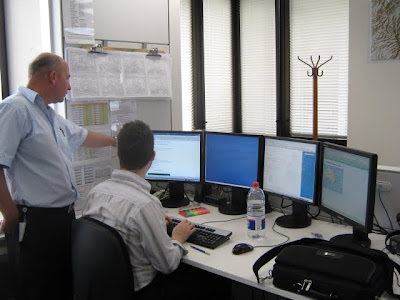River forecasters have a good deal in common with forecasters of other natural disasters, such as wildfires (called bushfires here in Australia). They inform response teams in the field that try to protect lives and property. Snap decisions have to be made under pressure. Lastly, you can always be sure that this coming year is going to be the weirdest yet.
Folk band Cry Cry Cry did a cover of "Cold Missouri Waters", a true story of a fire that seemed controllable but eventually consumed a number of fire fighters. Dodge is the main character and is speaking from his deathbed (Hodgkin's disease) 5 years after the fire. He is haunted because he was responsible for thirteen people who died. Forecasters, like firefighters have to deal with many ordinary, even boring situations. But when action happens, it comes quickly. Here are the lyrics.
My name is Dodge, but then you know that
It's written on the chart there at the foot end of the bed
They think I'm blind, I can't read it
I've read it every word, and every word it says is death
So, Confession - is that the reason that you came
Get it off my chest before I check out of the game
Since you mention it, well there's thirteen things I'll name
Thirteen crosses high above the cold Missouri waters
August 'Forty-Nine, north Montana
The hottest day on record, the forest tinder dry
Lightning strikes in the mountains
I was crew chief at the jump base, I prepared the boys to fly
Pick the drop zone, C-47 comes in low
Feel the tap upon your leg that tells you go
See the circle of the fire down below
Fifteen of us dropped above the cold Missouri waters
Gauged the fire, I'd seen bigger
So I ordered them to sidehill and we'd fight it from below
We'd have our backs to the river
We'd have it licked by morning even if we took it slow
But the fire crowned, jumped the valley just ahead
There was no way down, headed for the ridge instead
Too big to fight it, we'd have to fight that slope instead
Flames one step behind above the cold Missouri waters
Sky had turned red, smoke was boiling
Two hundred yards to safety, death was fifty yards behind
I don't know why I just thought it
I struck a match to waist high grass running out of time
Tried to tell them, Step into this fire I set
We can't make it, this is the only chance you'll get
But they cursed me, ran for the rocks above instead
I lay face down and prayed above the cold Missouri waters
And when I rose, like the phoenix
In that world reduced to ashes there were none but two survived
I stayed that night and one day after
Carried bodies to the river, wonder how I stayed alive
Thirteen stations of the cross to mark to their fall
I've had my say, I'll confess to nothing more
I'll join them now, those that left me long before
Thirteen crosses high above the cold Missouri waters
Thirteen crosses high above the cold Missouri shore


















